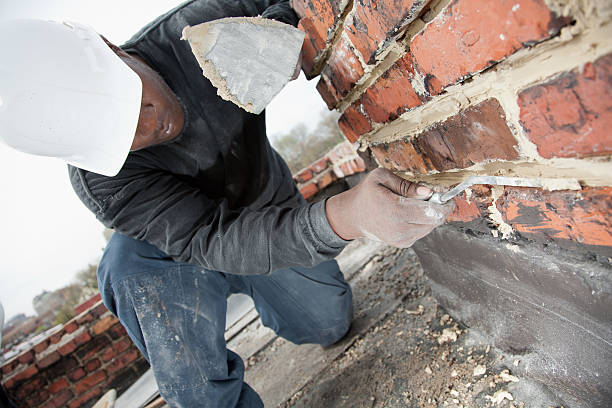Set Up a Chimney Sweep Today for a Tidy and Safe Fireplace
Set Up a Chimney Sweep Today for a Tidy and Safe Fireplace
Blog Article
Unlocking the Keys of Lasting Masonry Building Practices for Eco-Friendly Buildings
In the realm of contemporary construction, the search of lasting methods has become paramount. Among the myriad approaches to environmentally friendly building, lasting masonry construction attracts attention as a reliable and long lasting method that holds a wide range of untapped capacity. From the choice of products to innovative building and construction methods, the secrets to attaining sustainability within masonry building and construction are diverse and intriguing. By discovering the benefits, products, techniques, and future fads of sustainable masonry, a deeper understanding of exactly how these practices can form the future of environment-friendly buildings arises.
Benefits of Sustainable Stonework Construction
Welcoming lasting stonework building and construction techniques not just minimizes environmental effect but also offers lasting financial advantages to home builders and neighborhoods. By using materials like recycled blocks, obstructs, and rocks, home builders can dramatically reduce the carbon footprint of their jobs while advertising source efficiency. In addition, lasting stonework building methods, such as proper insulation and thermal mass residential or commercial properties, can enhance power effectiveness within buildings, leading to lowered functional costs with time.
Additionally, the longevity and strength of masonry frameworks add to lasting economic advantages. Buildings created utilizing sustainable stonework practices commonly require less repair and maintenance, converting to cost financial savings for home builders and building owners. The long life of masonry products also makes sure that frameworks remain secure and safe and secure, minimizing the demand for regular improvements or replacements.
Eco-Friendly Masonry Products
Utilizing eco-friendly stonework products is a critical action towards improving the sustainability of building and construction practices and decreasing environmental effect while making best use of long-lasting financial advantages. Sustainable masonry products are sourced, produced, and used in a fashion that decreases overall environmental influence. Products such as recycled bricks, recovered rock, and sustainable concrete blocks are coming to be progressively prominent selections for eco-conscious home builders. Recycled blocks, for example, not only divert waste from land fills yet also need much less power to generate contrasted to new bricks. Recovered stone supplies an one-of-a-kind aesthetic allure while minimizing the need for brand-new quarrying. Lasting concrete blocks incorporate recycled aggregates and may feature improved insulation residential or commercial properties, contributing to energy efficiency in structures.
Additionally, natural products like adobe, rammed planet, and straw bales supply superb thermal mass buildings, minimizing the demand for heating and cooling energy. These materials are commonly locally available, advertising local economic climates and reducing transportation-related carbon discharges. By picking green masonry products, building tasks can substantially reduce their ecological footprint and contribute to the creation of much healthier, more lasting constructed environments.
Energy-Efficient Stonework Techniques
Power efficiency plays a critical function in boosting the sustainability of masonry building techniques. By executing energy-efficient stonework techniques, building contractors can considerably minimize the overall energy intake of a structure, resulting in reduced operational expenses and a smaller sized environmental footprint. One crucial energy-efficient masonry technique is using thermal mass, which involves integrating thick products like concrete or block into the structure's structure to soak up and store heat. This assists control interior temperature levels, lowering the demand for mechanical heating and cooling systems.

Technologies in Sustainable Masonry
Recent innovations in sustainable stonework methods have caused ingenious methods that are improving the building market. One such advancement is the development of self-healing concrete, which uses microorganisms installed within the concrete to Discover More recover fractures autonomously. This innovation not just reduces maintenance prices yet additionally enhances the resilience of stonework frameworks, contributing to their sustainability.
An additional noteworthy advancement is using recycled aggregates in stonework building and construction - masonry contractor. By integrating products such as crushed ceramic waste or recycled glass into concrete blends, home builders can decrease the ecological impact of building tasks herringbone stamped concrete while maintaining structural stability. This technique not only draws away waste from landfills however additionally preserves natural resources, making it a crucial advancement in sustainable masonry building
In addition, the integration of digital style tools, such as Structure Details Modeling (BIM), is revolutionizing the method stonework frameworks are planned and constructed. BIM allows for more accurate computations, minimized product wastage, and improved energy efficiency, ultimately resulting in more sustainable building practices. These developments collectively signify an appealing future for sustainable masonry construction in the era of eco-friendly structures.
Future Trends in Stonework Sustainability
With the cutting-edge strides made in sustainable masonry practices, the future trends in stonework sustainability are positioned to more change the building and construction sector. Among the crucial patterns shaping the future of masonry sustainability is the increased assimilation of modern technology. Innovations such as Building Details Modeling (BIM) and digital fact simulations are being made use of to optimize masonry building procedures, causing minimized material waste and improved power effectiveness in buildings.
Furthermore, the growth of novel sustainable products is set to play a considerable role in boosting the eco-friendliness of masonry building and construction. masonry contractor. Advancements like self-healing concrete, recycled aggregates, and bio-based binders are gaining grip for their capability to minimize ecological effect while maintaining architectural stability

Verdict
To conclude, lasting stonework building and construction methods offer various advantages for environmentally friendly buildings. By using environment-friendly products and energy-efficient techniques, masonry can add to an extra sustainable built environment. Technologies in sustainable masonry are constantly being created to even more boost the environmental efficiency of structures. Looking towards the future, the fad of stonework sustainability is expected to expand, expanding concrete resulting in more ecologically pleasant and energy-efficient building and construction practices in the years to come.
Report this page